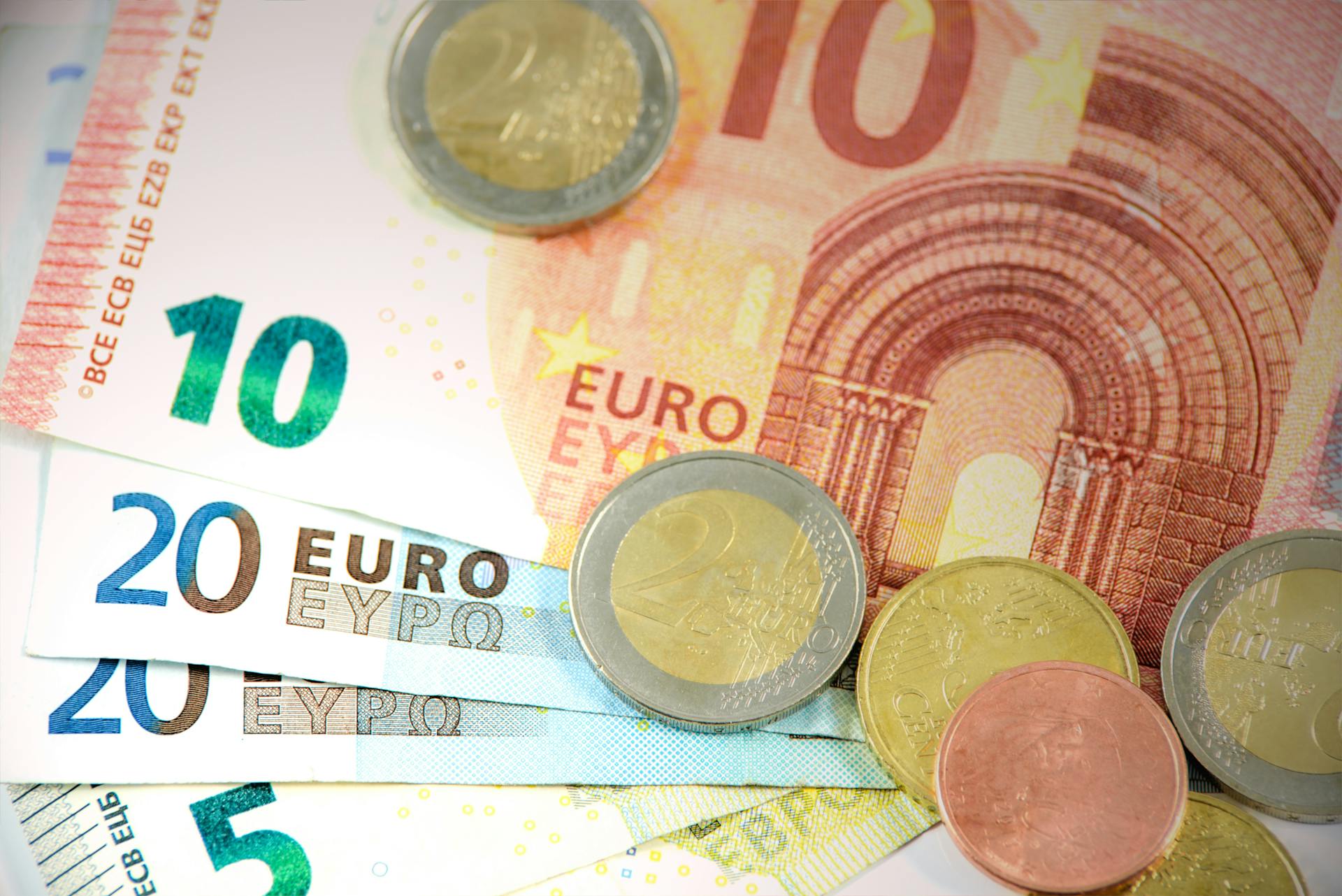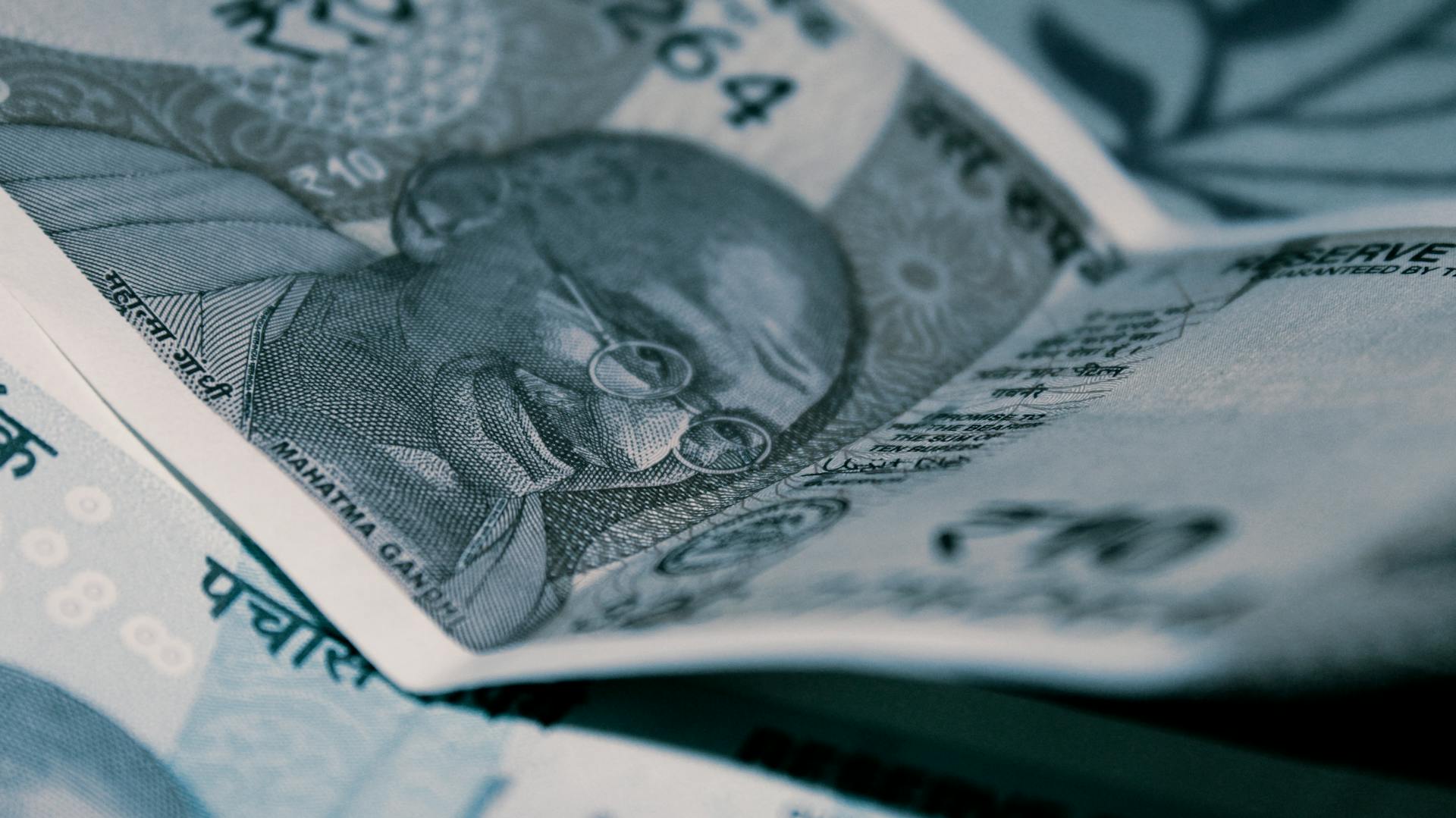
Portugal uses the Euro as its official currency, which is the same currency used by many other European countries.
You can exchange your currency for euros at airports, banks, and currency exchange offices, but be aware that exchange rates may vary.
The Euro is divided into 100 subunits called cents, and you can find coins in denominations of 1c, 2c, 5c, 10c, 20c, and 50c, as well as 1€ and 2€ coins.
Banknotes come in denominations of 5€, 10€, 20€, 50€, 100€, 200€, and 500€.
Understanding the Currency
The currency in Portugal has a rich history, and it's fascinating to learn about it. The escudo was introduced in 1911 to replace the Portuguese real, with a value set at 675 = 1 kg of gold.
The escudo's value fluctuated over the years, being fixed at 108.25 to £1 sterling in 1928, and later at 110 to £1 stg in 1931. This shows how currency values can change over time.
In the 20th century, inflation made centavos almost worthless, leading to the withdrawal of fractional value coins like 50 centavos and 2.5 centavos from circulation in the 1990s.
The Euro became Portugal's official currency in 1999, replacing the escudo. Today, the Euro is the dominant currency in Portugal, with a conversion rate of 200.482 = €1.
Here are the key facts about the Euro, Portugal's official currency:
Using the Currency
In Portugal, credit cards are widely accepted, especially in urban areas where you can confidently swipe your card at most establishments.
Carrying a bit of cash is still a good idea, especially if you plan to venture off the beaten path to rural or remote locations.
ATMs are scattered across Portugal and accept international cards, so you're never too far from a quick currency top-up.
In some charming corners of Portugal, cash is still king, so it's a good idea to keep some old-fashioned paper in your pocket.
Benefits and Tips
Waving goodbye to tedious currency conversions is a huge benefit of traveling to Portugal, where the Euro is the official currency.
You can stroll through Lisbon without calculating exchange rates at every street corner, which is incredibly liberating.
The Euro is your ticket to a hassle-free shopping spree in the vibrant markets of Porto, where you can shop without worrying about currency logistics.
It's the key that unlocks the door to a seamless travel experience, allowing you to focus on savoring the rich tapestry of Portuguese culture.
Payment Methods
In Portugal, credit cards are widely accepted, especially in urban areas, so you can confidently swipe your card at most establishments.
Carrying a bit of cash is still a good idea, especially if you plan to venture off the beaten path to rural or remote locations.
ATMs are plentiful in Portugal, with many accepting international cards, ensuring you can easily top up your currency when needed.
Credit Cards and ATMs
Credit cards are widely accepted in urban areas, so you can confidently swipe your card at most establishments.
However, always carry a bit of cash, especially if you're heading to rural or remote locations where digital payments may not be as popular.
Twenty-four hour ATMs, known as multibanco, are scattered throughout Portugal, making it easy to withdraw cash when you need it.
You can withdraw up to €400 per day, with a maximum of €200 at a time.
The ATM machines have clear directions in English and other languages, so you shouldn't have any trouble finding what you need.
Look for the image on the right to find the ATM machine.
If you need to exchange cash, you can do it at any bank, or visit a shop in a tourist area that offers this service - just be aware that a small commission will be charged, around €3 to €5.
Sending Money
Sending money internationally can be a hassle, especially when it comes to high fees and poor exchange rates. Many international banks charge fees that can constitute more than 10% of your transfer amount.
Fortunately, there are alternative providers that offer much better exchange rates, often beating those of traditional banks. You can find these providers by using a live comparison tool, which can save you time and money.
Sending money to Portugal is a common scenario, with many people transferring funds to support friends or family, pay for tuition, or settle business transactions. These transfers often involve sending euros to a euro bank account in Portugal.
International money transfers are a competitive market, with many trustworthy providers vying for your business. This competition can lead to better exchange rates and lower fees for you, the sender.
Exchange and Rates
The euro is one of around 180 currencies worldwide, which means it trades against all other official currencies globally.
Exchange rates can fluctuate over time due to various economic, political, and market factors. A higher exchange rate means the value of one currency has increased compared to another.
To track the euro's exchange rate in real-time, you can use a tool that updates exchange rates daily. This will give you an idea of the current value of the euro against other currencies.
With the right tool, you can also set up smart email alerts to follow fluctuations in the exchange rate. This way, you'll be notified when the rate passes a certain value.
You can use a currency converter to change euros into your local currency or the other way around. This will help you make informed decisions when traveling to or buying goods from Portugal.
Readers also liked: What Will You Do with Partially Destroyed the Us Currency
Featured Images: pexels.com


